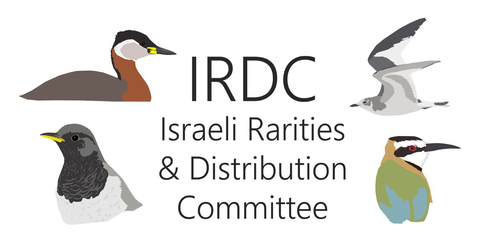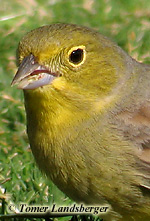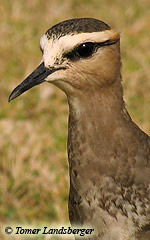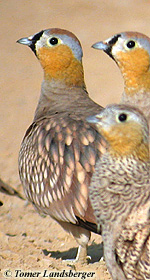The Israeli Rarities & Distribution Committee (IRDC) was re-established in 2000, realizing the need to improve the standard of rarity recording in Israel, to monitor changes in the country's avifauna, rarities in particular, and to make these available to the general public. Our main objectives are to improve the standards of rarity recording in Israel, leveling with those suggested by the European Association of Rarities Committees (AERC), and to improve the knowledge on bird distribution and distribution changes in Israel.
In general, the committee will examine rarities records of species and subspecies recorded in Israel, as listed in the IRDC species list. The IRDC will also examine records of more frequently seen species that are of special interest (e.g., species that has recently become rare) or species that may pose identification problems with commoner ones. Thus, the list of species that require submission for examination by the committee may be updated from time to time.
The committee publishes its decisions and additional information in its annual bulletin.
Please download the following Submission Form to submit your records.
Observers are encouraged to consult our guidelines for record submission before submitting their records.
►Which records require submission?
Basically, all records of species listed in the IRDC species list needs to be submitted for review by the IRDC, including records of observations made by the committee members.
►IRDC Bulletins
Bulletin No' 12:01 of the IRDC, published February of 2022
Bulletin No' 11:01 of the IRDC, published December of 2019
Bulletin No' 10:01 of the IRDC, published April of 2016
Bulletin No' 9:01 of the IRDC, published January of 2015
Bulletin No' 8:01 of the IRDC, published December of 2012
Bulletin No' 7:01 of the IRDC, published 2nd of May 2010
Bulletin No' 6:01 of the IRDC, published 2nd of March 2007
Bulletin No' 5:01 of the IRDC, published 2nd of January 2007
Bulletin No' 4:01 of the IRDC, published 4 th of March, 2005
Bulletin No' 3:01 of the IRDC, published 20th of February, 2004
Bulletin No' 2:02 of the IRDC, published 27th of November, 2002
Bulletin No' 2 of the IRDC, published 8th of July, 2002
Bulletin No' 1:02 of the IRDC, published 30th of November, 2001
Bulletin No' 1 of the IRDC, published 5th of June, 2001
The full Checklist of the birds of Israel and the species considered by the IRDC
►Why do I have to submit my records?
First of all, you do not have to, but we would very much like you to do so.
Why?
Well, there are two main reasons:
First, as birders we love our hobby and take it very seriously. We do not want to get misleading information and would like our knowledge of the birding world to be as robust as possible. Having an experienced and accepted committee to criticize extraordinary events is the way of the birding community to perform quality control of its knowledge. This form of criticism is by no means personal; it is just the way of the community to reduce the chance of accumulating disinformation. When an observation is rejected it means that, based on the given information, the committee either thinks that the identification was wrong, or that there is insufficient information to be sure of the identification beyond reasonable doubt. Thus, a rejection of an observation by the committee does not necessarily mean that it was false; rather it may mean that the committee thinks that the conditions of the observations or the information gathered of it are insufficient to rule out other likely possibilities.
The second reason is more scientific in nature.
The occurrence of rarities is a biological phenomenon; an unusual bird sighting can be of interest in the context of e.g., migration, orientation behavior, range extension, weather patterns and climate change. Careful, high-standard, documentation of such events may accumulate in time to be useful in contributing to answering scientific questions. For that the information gathered over time must first be substantiated and trustworthy. It should also be as complete as possible. Hence, reinforcing our request to submit all your rarities records to the committee, so that they could be examined, properly documented, and made available to the general public.
►Rarity processing
For matters of standardization, the IRDC adheres to the guidelines of the Association of European rarities committees (AERC) in examining submitted rarities records.
1. The committee consists of at least five people.
2. Every committee member receives a copy of the documentation of each record submitted to the IRDC, and comes to an independent decision, which is submitted to the chairman. If the opinions diverge, the record is circulated for a second time with the memberís arguments for and against it. A record is rejected if there are at least two negative votes in the second circulation. However, there is a provision to allow reconsideration of any record. Anyone can ask the committee to reconsider any vote, providing reasonable reasons are given for that.
3. Committee members can not vote on their own records.
4. If required, records may be sent to an expert or experts, not members of the committee, for independent evaluation.
5. The first (preferably the first five) records of a species should be supported by photographs, video films or tape recordings. In some cases, descriptions by highly qualified observers (preferably more than one observer) might suffice.
6. Reasons for non acceptance of a record will be given upon request to the appropriate birdwatcher.
7. All committee, consultants and specialist comments should be confidential prior to publication of any decisions. Information concerning records under consideration, or decisions prior to publication, or other committee matters should normally not be discussed outside the committee, except through the secretary or chairman to whom all outside enquiries should be directed.
►Members of the committee
Committee Members were chosen for their broad birding experience, proven record of finding and documenting rare birds in Israel and willingness to commit to the tasks of committee membership.
Active members:
Yosef Kiat, Yotam Lenard, Re'a Shaish, Barak Granit, Yoav Perlman (secretary)
Past members:
Hadoram Shirihai, Ehud Dovrat, Nir Sapir, Yaron Bazer, Ido Tsurim, Rami Mizrachi, Avner Cohen & Daniel Gelbert .
►Guidelines
Guidelines for record submission
The sighting of a rare bird is only the first step in establishing a record; evidence must be submitted to an independent committee.
Here we present our guidelines and recommend that discoverers of rare and unusual species adhere to them. We have attempted to redefine the standards of record assessment in Israel, details of which can be found on this page.
Ideally we would like to receive reports that include the following:
1. Written documentation of date, location, observers, weather and optical aids used.
2. Full written documentation of the events surrounding the observation.
3. Full written documentation of the identification complete with field notes.
4. The inclusion of good quality photographs, digital images or video images.
5. The inclusion of ringing data/ bio - metrics where appropriate.
6. The inclusion of sound recordings where appropriate.
7. Supporting documentation from co-observers.
8. Brief documentation of the observer's previous experience of the species.
* All multimedia material (photographs, video clips, vocal recordings) are for the purpose of record evaluation and documentation. They will not be used otherwise unless approved by the person who submitted them.
We realize that not every report will meet these criteria but we encourage all finders of Israeli rarities to submit what ever they can to the committee. Reports from sole observers will also be considered. On the other hand, reports that mention just a few lines of a description with comments such as "we didn't bother to look at it closely, because it's a common winter visitor back home" will not be considered seriously by the committee.
Finally, the language of record submission may be either English or Hebrew. However, we strongly encourage using English, as some committee members and consultants are not English speakers. Using English would therefore speed up our work, as we would not have to translate submitted records.
We look forward to receiving your records and publishing our results accordingly.
All observers with outstanding reports dating back to 1996 or earlier, are encouraged to submit their observations to any one of the committee members.
►Submission Form
Please download the following Submission Form to submit your records.
Observers are encouraged to consult our guidelines for record submission before submitting their records.



